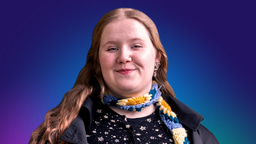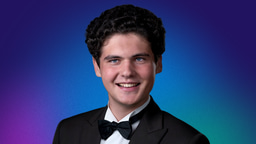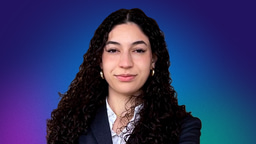Researching Neurodegenerative Disease with Columbia University Laidlaw Scholar Christina Lee
Find out more about Christina's research here.
00:30 Could you tell me more about yourself and your background?
00:55 Could you please describe your research?
02:16 How did you become interested in this research?
03:50 What are the applications of your findings?
04:48 How did this experience help you become a better leader and what are some of the most important leadership lessons that you've been taught during the Laidlaw scholarship programme?
06:14 What were some of the challenges that you came across during your research?
07:05 And who are some of the leaders that inspire you the most at the moment?
08:06 What do you hope to go on to do in the future?
TRANSCRIPT
NIKOL CHEN: Hi Christina!
CHRISTINA LEE: Hi!
NIKOL CHEN: How are you doing?
CHRISTINA LEE: I'm good, how are you?
NIKOL CHEN: I'm good, thank you. So, Christina, you're an undergrad at Columbia University and you recently co-first authored a paper that got published in Cell, which is amazing. And the paper was about the protein tau, which is involved in a lot of neurodegenerative diseases, as far as I understand. So, could you tell me a bit more about yourself and your background?
CHRISTINA LEE: Yes, so, I am currently in my 3rd year at Columbia, studying biophysics. My research interests kind of revolve around neuroscience and biophysics. And I've been working in a lab that I published the paper with since the end of my first year at Columbia, which is when I first received the Laidlaw Scholarship.
NIKOL CHEN: And so could you briefly describe your research?
CHRISTINA LEE: Yeah, sure. So, as you said before, tau is basically a protein that is associated with neurodegenerative diseases like Alzheimer's and corticobasal degeneration, which are the two diseases that the paper focused on. And so when I first started out in my lab, my research focused on more characterising brain samples of patients in order to quantify how much tau there was in these samples and to visualise it. And then when I moved on with the lab, I'd moved on to constructing the structure of tau in these patients' samples. And so, the lab that I work in focuses primarily on the technique cryoEM, which is basically unfreezing samples and transmitting electrons through these samples to achieve a really high resolution image of it, and from there you can start to construct the 3D structure of tau, and so with the paper we were able to combine mass spectrometry to start identifying post-translational modifications on tau, which are basically these additional molecules that kind of dot the molecule tau. And so, that's what my research is focused on.
NIKOL CHEN: And how did you become interested in that research?
CHRISTINA LEE: I feel like...so, before college, in school, I really liked science a lot and I really wanted to figure out a way to combine my interest in biology and chemistry and physics. So, when I was in high school, I did a project where we could teach a class on anything. In one of my chemistry classes, I taught a class on protein folding, and that was the first time that I realised that I could combine all these different disciplines of science. So, when I entered college I knew that I wanted to do some sort of research in protein folding of misfolding and so I started looking to structural biology labs and what I really liked about my lab was that I also had an interest in neuroscience because I feel like a lot of mysteries behind our nervous system and the way our body works and, you know, any kind of neural disorder is pretty devastating but it's something that attracts a lot of people. And I feel like the way we can start answering these questions and mysteries surrounding these neural disorders is by understanding on a more molecular or cellular level how these diseases work. So, combined with biophysics and my interest in neuroscience, that's kind of how I got into this research.
NIKOL CHEN: So, what are the applications of the findings of the paper that you wrote?
CHRISTINA LEE: Yeah, so I think a lot of people look to structural biology as a tool you can use hand in hand with therapeutics. So, a lot of drug companies use structure. And the thing is - before, people just had the structure and they never really looked at post-translational modifications or other blobs that surrounded the molecules. But if you think about it, if you're creating a drug that's supposed to fit with your molecule, it's not going to fit perfectly if you do have these additional molecules dotting the surface of the structure. So, that's one way in which we can use our structure for other purposes.
NIKOL CHEN: And how did this experience help you become a better leader and what are some of the most important leadership lessons that you've been taught during the scholarship programme?
CHRISTINA LEE: So, I think from a scientific perspective it was really nice to take charge of my own project, of course with the guidance of my mentor, but I think it was really nice because I was able to design my own experiment and my own project and I was working on something that I was really really excited about, something I was really passionate about and this was kind of the driving force that pushed me through the project regardless the challenges that I encountered. It really taught me how to be creative because since I was in charge of my own project, I had to think of creative ways to kind of work around challenges and to keep the project moving forward. I also learnt how to communicate better, which I think is a very important thing about leadership because research is really collaborative, and so, I feel like communication is really important inside of your lab and also outside of it. So, I think that's where the Laidlaw Scholarship really came in because I was with my own cohort and we were doing these workshops and we learnt a lot about how to communicate with others effectively and i think with research that's really important because you're communicating your results and you're sharing with people who are not necessarily familiar with what you're doing and you're learning how to communicate that in a way that's effective and powerful.
NIKOL CHEN: What were some of the challenges that you came across during your research?
CHRISTINA LEE: I think when I first started out with my research, it was the end of my first year of college and I had never really done any legitimate lab work before. So, I think in the beginning I was just learning everything and I took on a very independent role very early on which I think was challenging in one sense because I felt like I was in charge of what steps I had to take. So, there were a lot of technical problems that I encountered at first. Then, beyond the technical problems it was just learning how to ask other people for help and ask questions, instead of just struggling by myself. So, I learnt a lot through this process, yeah.
NIKOL CHEN: And who are some of the leaders that inspire you the most at the moment?
CHRISTINA LEE: So, I think when I think about leaders...I do think from a bit of a scientific perspective. Ever since I was younger I looked to a lot of scientists for inspiration and scientists like Dorothy Hodgkin, a biochemist, or Jocelyn Bell Burnell who is an astrophysicist. And I think when I name these scientists I think of them as leaders because they, first of all, achieved a lot with their own fields, and they have overcome a lot of challenges - technical and academic, and also just personal ones. And I think after overcoming those, they went on to share that success and they began encouraging others within that field, and I feel like that's what means 'very inspiring leaders' to me.
NIKOL CHEN: And just as the last question, what do you hope to do in the future?
CHRISTINA LEE: Yeah, so, right now I really want to pursue research for the rest of my life, basically. So, I would like to get a PhD and continue working on research. My exact field is not entirely determined but I do know that I want to stay within biophysics, maybe with applications in neuroscience.
NIKOL CHEN: OK, that's perfect. Congratulations, that's such an amazing achievement!
CHRISTINA LEE: Thank you!
NIKOL CHEN: It's so amazing. Thank you so much, Christina! Thanks for talking to us!





Please sign in
If you are a registered user on Laidlaw Scholars Network, please sign in